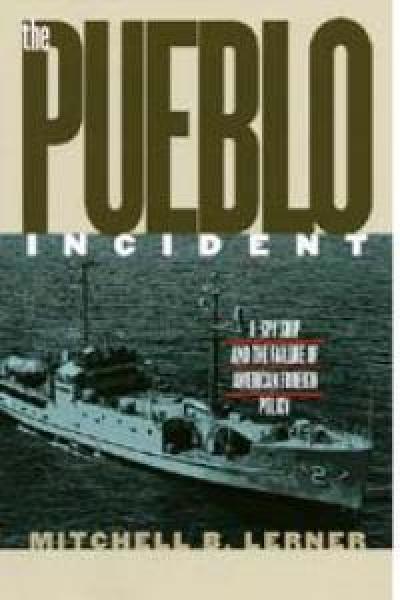The Pueblo Incident: A Spy Ship and the Failure of American

Lerner, Mitchell B.
"Remember, you are not going out there to start a war," Rear Admiral Frank Johnson reminded Commander Pete Bucher just prior to the maiden voyage of the U.S.S. Pueblo. And yet a war-one that might have gone nuclear--was what nearly happened when the Pueblo was attacked and captured by North Korean gunships in January 1968. Diplomacy prevailed in the end, but not without great cost to the lives of the imprisoned crew and to a nation already mired in an unwinnable war in Vietnam.
The Pueblo was an aging cargo ship poorly refurbished as a signals intelligence collector for the top-secret Operation Clickbeetle. It was sent off with a first-time captain, an inexperienced crew, and no back-up, and was captured well before the completion of its first mission.
Drawing on thousands of pages of recently declassified documents from President Lyndon Johnson's administration, along with dozens of interviews with those involved, Mitchell Lerner provides the most complete and accurate account of the Pueblo incident yet available. He weaves on a grand scale a dramatic story of international relations, presidential politics, covert intelligence, capture on the high seas, and secret negotiations. At the same time, he highlights the personal struggles of the Pueblo's crew--through capture, imprisonment, indoctrination, torture, and release--and the still smoldering controversy over Commander Bucher's actions. In fact, Bucher emerges here for the first time as the truly steadfast hero his men have always considered him to be.
More than an account of misadventure, The Pueblo Incident is an indictment of America's Cold War mentality. Lerner argues that had U.S. policymakers regarded the North Koreans as people with a national agenda, rather than as serving a global Communist conspiracy, they might have avoided the crisis or resolved it more effectively. He also addresses such unanswered questions as what the Pueblo's mission exactly was, why the ship had no military support, and how damaging the intelligence loss was to national security.
With North Korea still seen as a rogue state by some policymakers, The Pueblo Incident provides key insights into the domestic imperatives behind that country's foreign relations. It astutely assesses the place of gunboat diplomacy in the modern world and is vital for understanding American foreign policy failures in the Cold War.
“Engrossing analysis of Vietnam-era diplomacy, naval history, and Cold War politics—embedded with fascinating parallels between the events of 1968 and today’s crisis over terrorism.”--Kirkus Reviews
“A gripping story of courageous officers and their crew who had to suffer from the stupidity and incompetence of their superiors.”--Virginia Quarterly Review
“A new and insightful look at this dramatic and potentially explosive incident.”--Sea Power
“A lively account, backed by extensive research.”--Foreign Affairs
"The Pueblo Incident has found its biographer. Lerner tells the story well at the micro level, displays complete mastery of his sources, and fits his story compellingly into the context of the times."--William Stueck, Jr., author of The Korean War
"Expands our understanding of U.S. Cold War politics and its ideological trappings. I learned so much from this book."--Larry Berman, author of No Peace, No Honor: Nixon, Kissinger, and Betrayal in Vietnam
"Should sound a warning to anyone who seeks simplistic formulas to explain and defeat today's international terrorism."--Kenneth J. Hagan, author of This People's Navy: The Making of American Sea Power
"A cautionary tale that resonates today." --Edward J. Drea, author of MacArthur's ULTRA: Codebreaking and the War Against Japan, 1942–1945
Investigators
Filters: 2003
